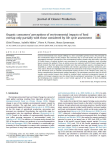Thomas C., Maître I., Picouet P.A., Symoneaux R. (2021). Organic consumers' perceptions of environmental impacts of food overlap only partially with those considered by life cycle assessment. Journal of Cleaner Production, 20/05/2021, vol. 298, p. 1-13.
https://doi.org/10.1016/j.jclepro.2021.126676
https://doi.org/10.1016/j.jclepro.2021.126676
| Titre : | Organic consumers' perceptions of environmental impacts of food overlap only partially with those considered by life cycle assessment (2021) |
| Auteurs : | C. Thomas ; I. Maître ; P.A. Picouet ; R. Symoneaux |
| Type de document : | Article |
| Dans : | Journal of Cleaner Production (vol. 298, May 2021) |
| Article en page(s) : | p. 1-13 |
| Langues : | Anglais |
| Langues du résumé : | Anglais |
| Catégories : |
Catégories principales 08 - ALIMENTATION ; 8.1 - Consommation Alimentaire. ComportementThésaurus IAMM COMPORTEMENT DU CONSOMMATEUR ; PHYSIOLOGIE SENSORIELLE ; ALIMENTATION HUMAINE ; AGRICULTURE BIOLOGIQUE ; ALIMENT BIOLOGIQUE POUR HOMME ; ANALYSE DU CYCLE DE VIE ; IMPACT SUR L'ENVIRONNEMENT ; CHAINE D'APPROVISIONNEMENT |
| Résumé : | Current environmental issues require shifting to a more sustainable agri-food sector. The perception of the environmental impact of the products that consumers buy is not well known. The present study investigated consumers’ perceptions of the environmental impacts related to the food chain. A group of 28 French buyers of organic products were questioned in a preliminary qualitative study, assuming buyers consume the products. Then, an online survey was conducted with 523 French organic buyers. Results showed that their perceptions included more than just pollution aspects, encompassing sustainability as a whole, including social (health) and economic (agricultural and other production activities) aspects. Results also highlighted that they did not understand certain impact categories used in life cycle assessment (LCA) to estimate environmental impacts because of the complex terms used (e.g. marine eutrophication, photochemical oxidant formation). The participants perceived that LCA did not consider some positive impacts that should be included when assessing environmental impacts. In addition, LCA impact categories were less broad than the participants’ perceptions. This study suggests that developing new ecolabels needs a more holistic approach of the impacts of food, considering positive and negative impacts. |
| Cote : | Réservé lecteur CIHEAM |
| URL / DOI : | https://doi.org/10.1016/j.jclepro.2021.126676 |







